This article is for ambitious marketers. If you believe publishing the occasional blog post is all it takes to establish and build authority with content, you can skip this one.
Don't get me wrong; I'm bullish on blogging. If you recognize content marketing as a path to positioning yourself or brand as a subject-matter expert, you can definitely make inroads with a blog.
But what if you want to do more than make a ding now and then? What do you do if you want to make a big-time dent in the infosphere?
You need to do more. Note the use of the word "extra" in the article headline. The authority-building content approaches I'm about to endorse and explain take extra work. And like most things in life, extra effort goes a long way toward producing bigger outcomes.
I'm talking about...
- Teaching a course
- Publishing research
- Hosting a podcast
- Public speaking
- Writing a book
And here's why.
Remove your marketing hat and put your buyer chapeau on for a moment. You're in the market for a car, pool, software system, adviser, surfboard—anything you consider to be more than a trivial purchase decision.
Then, by way of your research—maybe via search, social, or in conversation—you learn that So-and-So teaches or speaks, hosts a program, publishes research, or has written a book on the very topic you need to know more about.
My point's hella-obvious, right? You'd be wise to tune into what So-and-So has to say. She knows her stuff. He's credible. Their insights loom larger than what your next-door neighbor or friend from the dog park has to say.
OK, credibility seeker, let's get to authority building with turbocharged content.
1. Teach a course
I want to start with this approach for two reasons. One: though it'll take some doing, creating an online course may be easier than the approaches that will follow. And two: creating a course—especially a free course—may be the least-used strategy in this five-pack.
In The Ultimate Guide To Creating and Selling Online Courses, Kajabi, a company that offers a comprehensive "knowledge commerce platform," professes an online course can give you...
- Credibility: The post says, "If you don't have a fancy degree or 30 years of experience, an online course shows people that you know what you are talking about. It establishes your expertise, credibility, and authority."
- Passive income: This assumes you'll charge for your course or charge for other information products tied to your course.
- A great lead generator: This benefit may come by way of free or paid course. Many content marketers charge a low fee for one or more courses to stimulate interest in other products and services.

Smart stuff from Leadpages: one of its many free courses.

Here's a solopreneur exploring the online course path for authority-building. This course, from Norah Levine, is not free—it's $40. The first frame of this video has me convinced she knows her stuff. And, if it should lead viewers to her website, they'll find a ton of content that makes her expertise even more obvious and convincing.
I want to make another important point before we move on. A course can be polished video-based content like the examples above—or not. A course can be a series of homemade, no-budget videos, audio recordings, articles, emails, some combination thereof, or whatever you decide.
The idea is to teach. You don't need a TV studio to do that. A chalkboard or laptop will do just fine.
2. Create industry research
If you want engagement, research rocks the Web. You put in the effort to dig up meaningful data on a useful topic, analyze it, present it in a form that's easy to understand, publish it... and voila, you own that conversion.
I'll show you some examples in the digital marketing space.
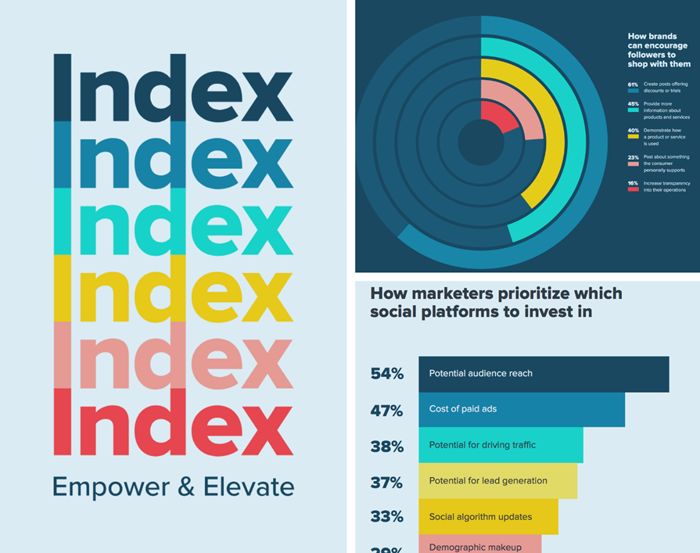
Here are a few small slices from the annual Sprout Social Index, which has been published for 15 consecutive years. Want to look at a credible source of insights regarding social media? There you go.

Each year Content Marketing Institute and MarketingProfs join forces to deliver an essential review of the trends shaping content marketing.
"Content comes in all shapes and sizes. Helpful how-to's, webinars, whitepapers, roundups, and rants," writes Orbit Media's Andy Crestodina, a loyal servant of the content marketing world. "But there is one type of content that crushes almost anything else you can publish. Original research."
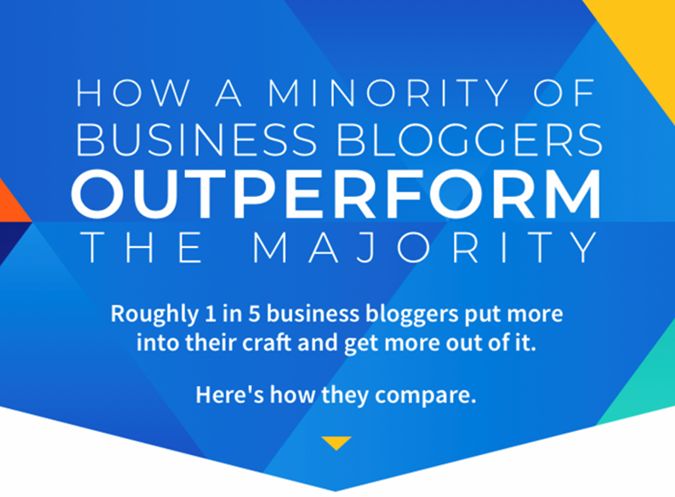
Orbit Media publishes an annual report on the state of business blogging, and there's no question Andy and company know the terrain.
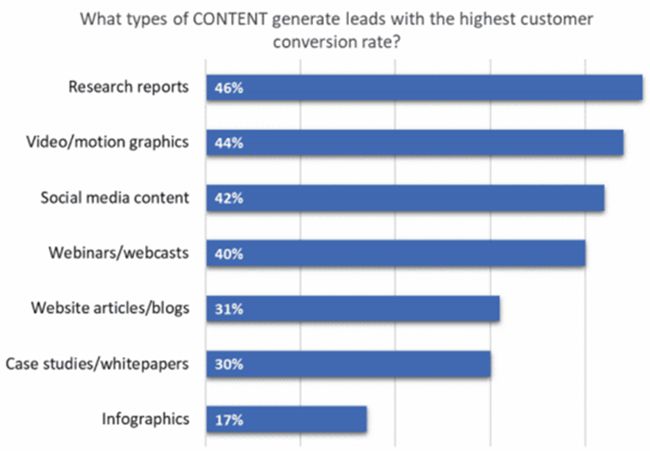
Mega-bonus: conversion. Research reports perform best for conversion rates, according to data published by SmartInsights.
3. Host a podcast
Podcasting has caught on and continues to grow each year: 22% of Americans listen to a podcast each week, according to The Podcast Consumer report from Edison Research. Atop the reasons for why people love podcasts is that they can do other things while listening.
"Podcasting has the potential to create authority while building your brand," writes Michelle Polk of UpBuild. "With countless topics out there, everything is up for grabs, and those who podcast about their business, fields of interest, and niches inherently become ambassadors of their brand and industry."
More so than your written content, your podcast creates a bond with your audience. Hearing an expert dispense advice creates connection and trust.
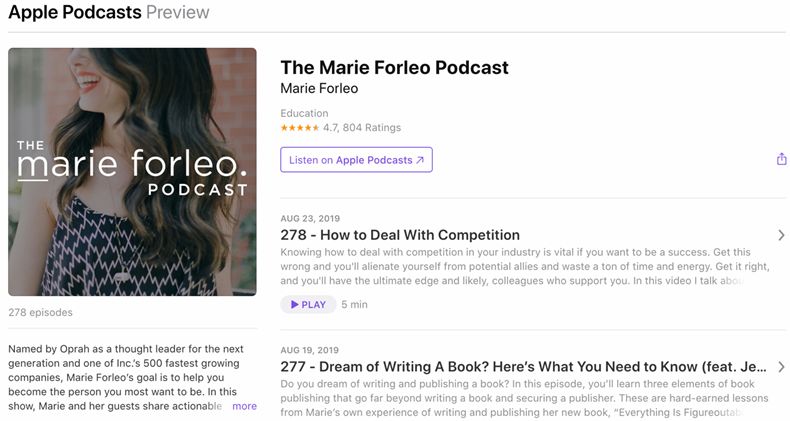
Many people who listen to the podcast of life-coach and entrepreneur Marie Forleo feel as though Marie is a trusted friend.
Obviously, hosting a podcast is a commitment. On an ongoing basis, you must put in the time to plan the programs, record, do post-production, and promote the show.
Many podcasts are based on an interview format, which involves booking guests. I mention this because the process of doing so essentially creates connections to, and relationships with, top experts in your niche, which is yet another path to building authority. It's also fun and rewarding.
Here's a great tutorial for starting a podcast.
4. Speak
People invest their time and money to attend conferences and events. The important choices the event organizers make regarding who will stand at the podium is based on subject-matter expertise.
Here's a random sample of sessions from the upcoming MarketingProfs B2BForum:
- A Simple Formula for Winning Google's Featured Snippets
- How to Build a More (Artificially) Intelligent Content Engine
- How to Publish Credible & Compelling Research: 15 Things You Need to Know
As you see, each looks to be a very specific session, and you would expect to hear from speakers who are authorities in search, AI, and research.
There's no doubt that speaking positions you as an expert. Understand, however, that speaking, like each of the ideas I've presented, requires extra effort.
Speaking from experience (give me a pun pardon, please), I'll tell you I've dabbled in speaking. The idea doesn't petrify me. There are a number of topics I believe I'm an expert in, and rumor has it that I have a way with words. I also know how to create killer slides.
Naturally, I'd be a great speaker, right?
I wish. It's simply not easy, or natural. Nailing the practice of public speaking takes disciplined practice. The best of 'em have coaches and trainers, so if you're serious about adding speaking to your authority building arsenal, get serious about honing your skills. It's bound to payoff.
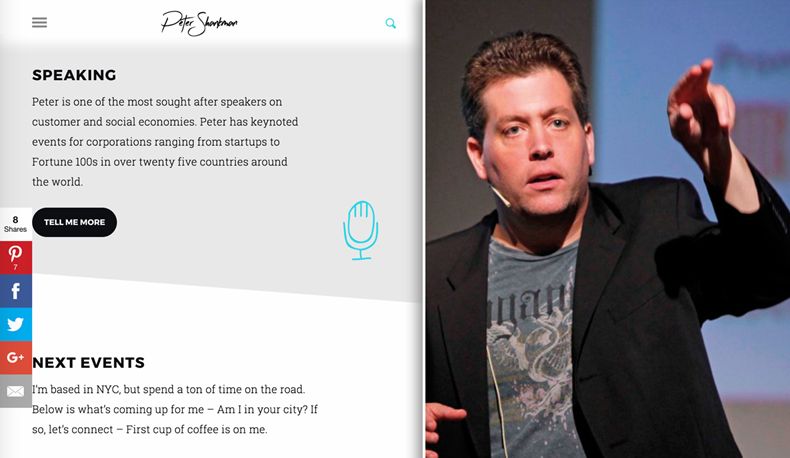
Accomplished speakers like Peter Shankman not only build authority in their niche via speaking but also "productize" their speaking services and promote them via their website and other channels.
5. Write a book
I associate authors with authorities. Don't you? Often, you hear:
- "He wrote the book on (specific topic)"
- "She's the author of (book title)."
Recently I was tasked with writing content about delivering effective software sales demos. Gulp. I know about as much about delivering software demos as I do composing concertos or repairing cars.
What'd I do? I went to Amazon. I searched "software sales demos." I didn't need to be needled to conclude that those who had authored books on the topic are among the foremost experts on the topic. I read their books. I interviewed them. I learned a lot.
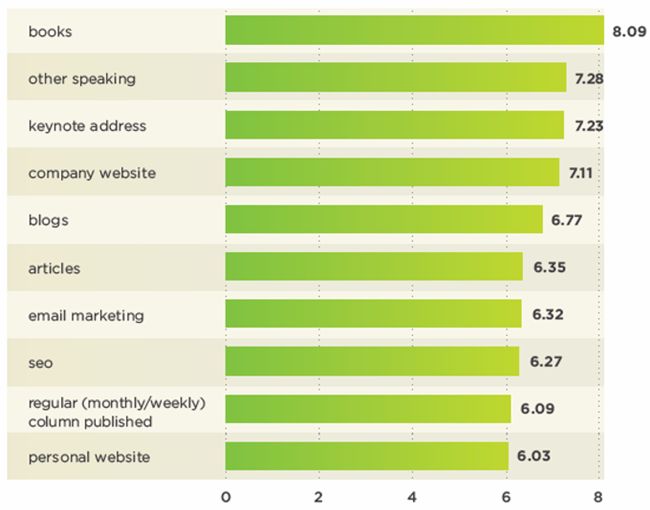
Research from The Visible Expert by Hinge Marketing shows that books deliver the highest overall impact for building visibility, and in turn, authority.
I rest my case. There's no greater way to carve out a claim to authority in a niche than writing a book about it. Strike that. There's no greater way to carve out a claim to authority in a niche than writing a great book about it. Obviously, in the age of self-publishing, anyone can publish a book. Go there only if you have the time and resources to create a valuable book unlike any that's come before it.
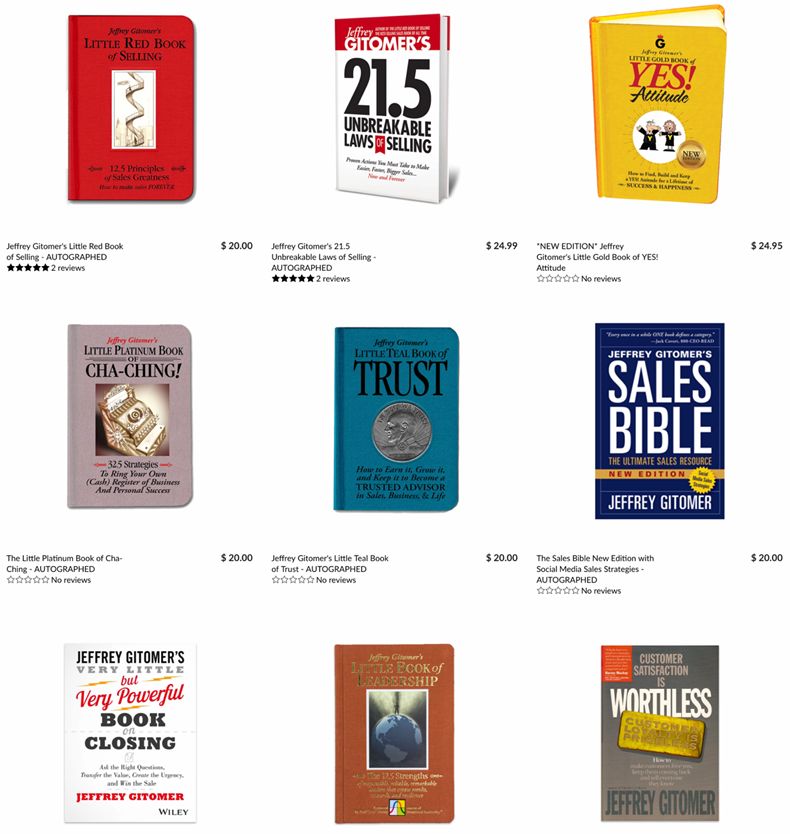
Publishing books was clearly an authority-building strategy for sales guru Jeffrey Gitomer. And though his library is vast, like you and everyone else he had to start with one.
I want to make another point about book writing because I believe far too many people shy away from pursuing it because they believe someone beat them to it. So, imagine someone wanted to write about the problems two lovers face when they come from different or opposing sides of society. They then take pause when they're warned Shakespeare covered the subject in Romeo and Juliet.
But that'd be a ridiculous reason not to write a book. A similar story can take an entirely different shape with new characters or unique twist—in fiction and nonfiction.
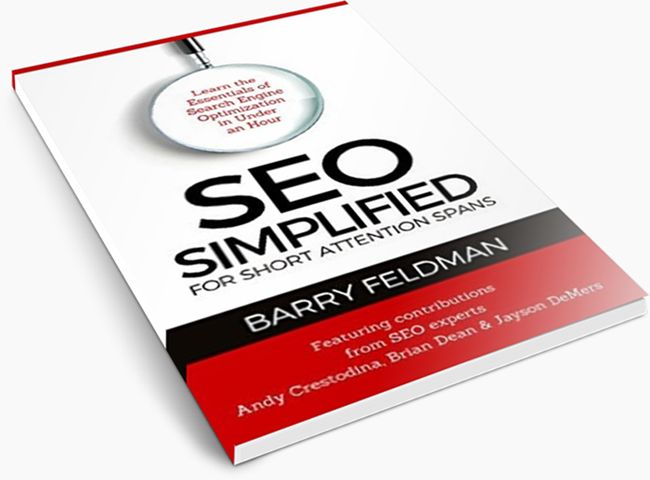
Case in point: When I wrote my first book, I was certainly not the first to tackle the topic of SEO, nor am I the world's leading authority on it. What I had was an angle: The book's for those who want to learn the basics fast (and I hope the title makes that obvious).
One final note regarding writing a book: it does not need 200-plus pages. A super-skinny book might have come across as lightweight in the print-only era; today, a 100ish-page book that can be devoured in an hour or two is a welcome addition to the digital bookshelves of many readers.
Extract extra value from your extra efforts
I don't have a sixth authority-building channel for you here, but I do have what I think is a hugely important point:
The effort you put into pursuing any one of these five approaches can be parlayed into the others. For example, your course could be developed into a book. Your research can be the focus of speech at a conference. The list could go on... And of course the big stories you tell can be sliced and diced into little ones, and the short stories can be combined into big ones.
Approach these "extra-effort tactics" with some extra strategic thinking about repurposing and you'll add a multiplier effect to your authority-building.




